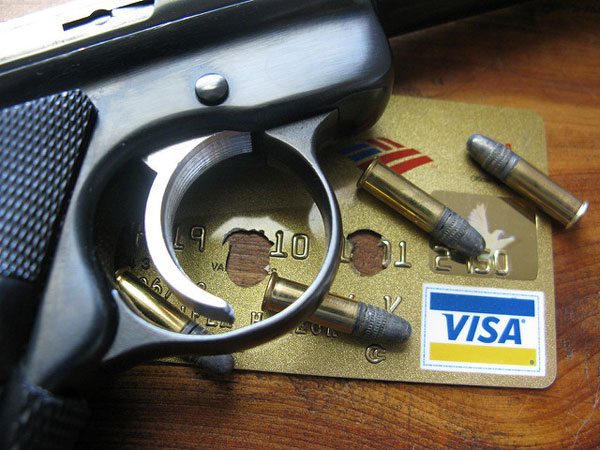
February 19, 2018; New York Times
Writing in the New York Times, Andrew Sorkin has a simple suggestion for credit card companies that wish to have a positive social impact in the US: Stop financing gun purchases. Sorkin asks, “What if the finance industry—credit card companies like Visa, MasterCard and American Express; credit card processors like First Data; and banks like JPMorgan Chase and Wells Fargo—were to effectively set new rules for the sales of guns in America?”
The stakes are high. As NPQ has covered, students and teachers who survived the shooting in Parkland are already organizing a national school walk out on March 14th and marches on March 24th, calling for an end to government inaction. “We’re marching because it’s not just schools,” says Parkland high school survivor Alex Wind. “It’s movie theaters, it’s concerts, it’s nightclubs. This kind of stuff can’t just happen. You know, we are marching for our lives, we’re marching for the 17 lives we lost. And we’re marching for our children’s lives and our children’s children and their children.”
It would be better if politicians already were heeding the popular call for action. But in the face of intransigence, might private sector action make a difference?
It has happened before, of course. For example, just last December, the ratings agency Moody’s issued a report suggesting that cities and states that failed to develop climate change adaptation plans might see their credit downgraded and therefore face higher borrowing costs. In case this wasn’t clear enough, Michael Wertz, a vice president at Moody’s, added that, “If you have a place that simply throws up its hands in the face of changes to climate trends, then we have to sort of evaluate it on an ongoing basis to see how that abdication of response actually translates to changes in its credit profile.” When you get “guidance” like that, it doesn’t really matter what position Washington has on the Paris climate agreement; city managers are going to pay more attention to their bond ratings than Washington.
With guns, Sorkin suggests that business could apply similar pressure. Sorkin writes that credit card companies “could easily change its terms of service to say that it won’t do business with retailers that sell assault weapons, high-capacity magazines and bump stocks, which make semiautomatic rifles fire faster.” Sorkin adds that, if major credit card companies like Visa and MasterCard were to do this, “assault weapons would be eliminated from virtually every firearms store in America because otherwise the sellers would be cut off from the credit card system.”
Sign up for our free newsletters
Subscribe to NPQ's newsletters to have our top stories delivered directly to your inbox.
By signing up, you agree to our privacy policy and terms of use, and to receive messages from NPQ and our partners.
Of course, an obvious shortfall of Sorkin’s idea is that keeping semi-automatic rifles out of stores would not preclude cash sales of those same rifles at gun shows. That said, it would make it harder to obtain assault weapons, which would likely reduce the number of mass shootings.
Sorkin notes that such a move is not impossible: “PayPal, Square, Stripe, and Apple Pay announced years ago that they would not allow their services to be used for the sale of firearms.” A spokesman for Square, for instance, told Sorkin that, “We do not believe permitting the sale of firearms on our platform is consistent with our values or in the best interests of our customers.”
Sorkin adds that, “There is precedent for credit card issuers to ban the purchase of completely legal products. Just this month, JPMorgan Chase, Citigroup and Bank of America banned the use of their cards to buy Bitcoin and other cryptocurrencies.” As Sorkin elaborates, “To be clear: Those three banks won’t let you use your credit card to buy Bitcoin, but they will happily let you use it to buy an AR-15-style semiautomatic rifle—the same kind of gun used in mass shootings in Parkland; Newtown, Conn.; San Bernardino, Calif.; Las Vegas; and Sutherland Springs, Tex.”
Off the record, Sorkin indicates that all of the chief executives he spoke to “applauded the idea [of not allowing the use of credit cards at stores that sell dangerous rifles] and some said they had already been thinking about it.” Some, Sorkin adds, “called their peers to begin a conversation.”
Sorkin raises an interesting possible market-based strategy. But these companies could also talk to legislators. Visa, for example, spent $3.75 million on lobbying last year and MasterCard spent $3.28 million. Apple, which already prohibits gun purchases on Apple Pay, had 2017 lobbying expenses of $7.07 million. In short, these companies regularly lobby on Capitol Hill. Typically, such lobbying focuses on direct financial interests. But maybe, in this instance, these and other companies could lend their political weight to a broader cause. And by aligning themselves to the marching students, they might even help make America’s schools safe once more.—Steve Dubb













